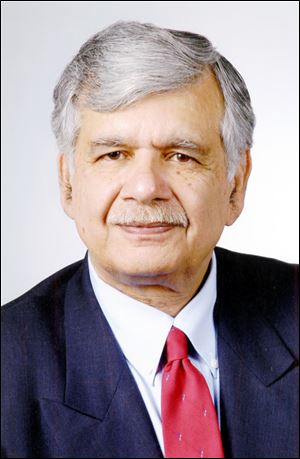
COMMENTARY
Drawing parallels between Trump-Comey, Henry-Becket
6/19/2017
King Henry II ruled England more than 800 years ago. However, the frustration of the king with one of his prominent subjects resonates with the unfolding Russian probe in the United States.

Hussain
The stories of paranoid monarchs, shifting loyalties, and expectations of complete loyalty were rather common in the days of absolute monarchs, or so we thought. Many writers and poets have written about human nature with all the trivialities, jealousy, intrigue, and treachery that we human beings are capable of displaying. There were faithful servants who willingly or unwillingly fell on the sword and took the fall. Stories from medieval England are intriguing and tempt us to draw a parallel with the contemporary.
Recently, fired FBI director James Comey testified before the Senate Intelligence Committee about Russian meddling in the 2016 U.S. Elections. Mr. Comey told the committee that during a one-on-one meeting with the President in the Oval Office, President Trump hoped that Mr. Comey would drop the Flynn-Russia investigation. A committee member asked Mr. Comey if he took the President’s “hope” as a directive to drop the investigation. To that Mr. Comey answered: “Yes, yes. It rings in my ears as kind of ‘will no one rid me of this meddlesome priest?’ ”
Meddlesome priest?
It was an interesting literary reference during the hearing. Mr. Comey was referring to the comments attributed to King Henry about Thomas Becket.
During King Henry’s reign there was a tussle between Henry and Pope Alexander III over the rights and privilege of the church. The pope had instituted reforms that required the priests to side with Rome and not with the king. One of the reasons was that the pope did not want the secular courts in England to try the priests who had been accused of committing a crime.
The pope demanded the priests to be loyal to Rome and not be mere vassals of the English king. Becket was a friend of King Henry and the king had played a pivotal role in having him elected Archbishop of Canterbury. So when Becket started siding with the pope, the king considered him disloyal. The king lashed out against the archbishop in his remarks to the knights, “Will no one rid me of this meddlesome priest?”
The phrase Meddlesome Priest, however, was a later embellishment of what the king had actually said. The phrase was first heard in the movie Becket in 1994.
What the king is believed to have said to his courtiers was, “What miserable drones and traitors have I nurtured and promoted in my household, who let their lord be treated with such shameful contempt by a low-born clerk.”
Becket was indeed lowborn and had worked in his early life as a clerk for the city. He rose through the ranks and by the time he was in his early 30s the king appointed him his Lord Chancellor.
After hearing the king’s angry speech about Becket, four knights rushed off and killed the “meddlesome priest” in the cathedral. A man by the name of Edward Grim, a friend of Becket, was at the scene and later he wrote the biography of Thomas Becket and documented the events.
The king did not order his knights to kill Becket, and he denied doing so.
His statement to the royal knights was, in pure legalese, not an order to kill the archbishop. But when a powerful man lets his wishes known, the servants (including civil servants) realize they are being ordered to carry out the wishes. “Your wish is my command, sir,” is the expected refrain from the courtiers. The ‘uncivil servants’ could ignore the wish of a king at their own peril, just as James Comey did and lost his job.
King Henry was excommunicated from the church and had to pay penance to be readmitted into the fold. Protestant reformation was still 400 years away in the future.
Times have certainly changed but the basic human traits have not. Palace intrigues, paranoia, and a siege mentality are as evident today as they were in the days of King Henry.
There still are servants who serve at the pleasure of the latter-day kings and quite a few would fall on a sword to spare their master the embarrassment.
S. Amjad Hussain is an emeritus professor of surgery and humanities at the University of Toledo. His column appears every other Monday in The Blade. Contact him: aghaji@bex.net.